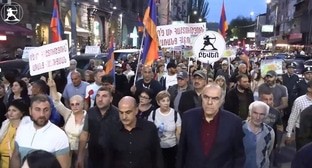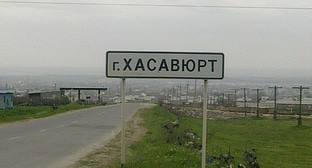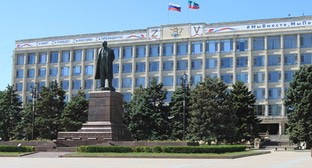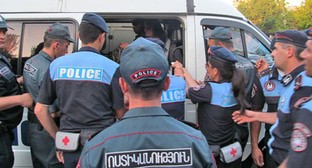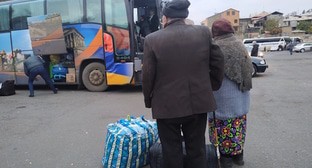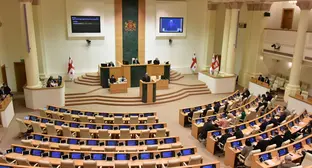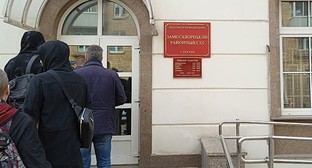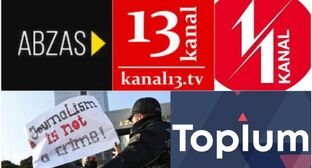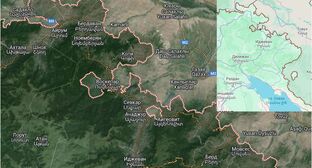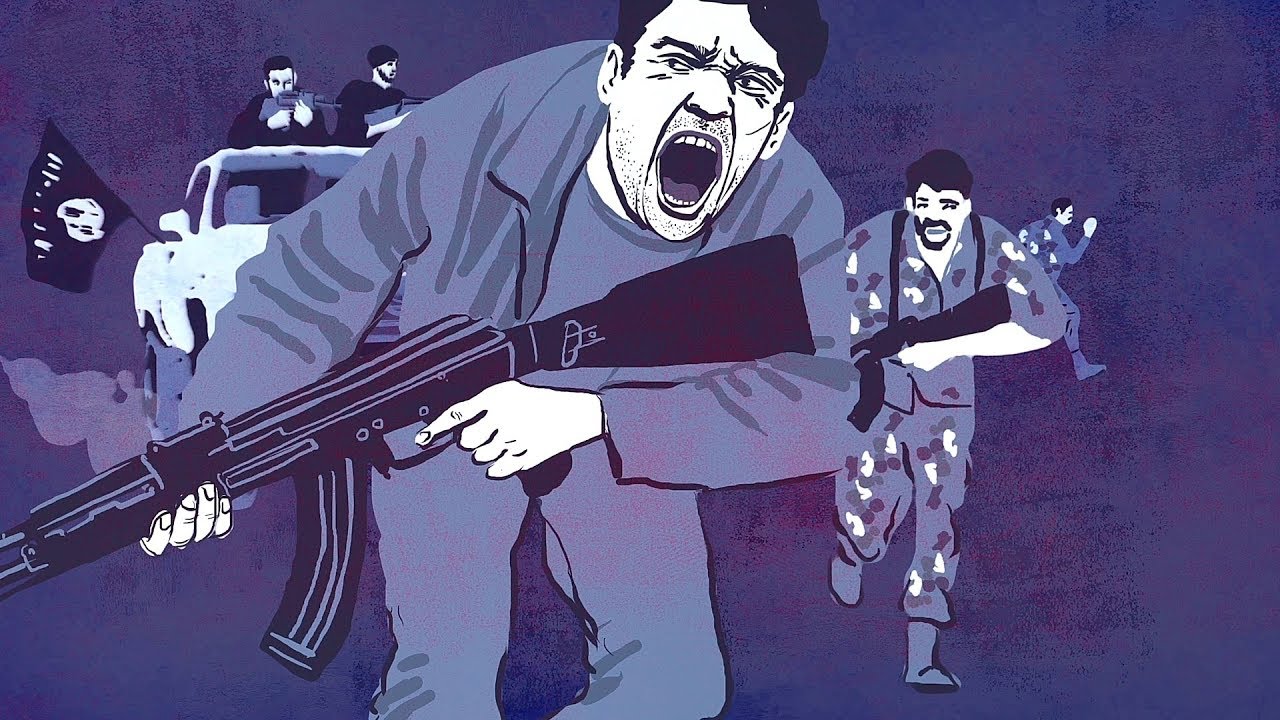30 сентября 2006, 16:46
Adam Dolnik: "The Practice of accusing organizations of terrorism is hardly effective in antiterrorist struggle"
НАСТОЯЩИЙ МАТЕРИАЛ (ИНФОРМАЦИЯ) ПРОИЗВЕДЕН И РАСПРОСТРАНЕН ИНОСТРАННЫМ АГЕНТОМ ООО "МЕМО", ЛИБО КАСАЕТСЯ ДЕЯТЕЛЬНОСТИ ИНОСТРАННОГО АГЕНТА ООО "МЕМО".
On 19 July, 2006, the Russian government published a list of seventeen entities designated as terrorist organizations. The purpose of this practice, which is used in many other countries around the world, is to ostracize the groups politically, raise general awareness of their presence and activities to put pressure on them, as well as to provide the legal foundation for making any dealings with them including financial assistance illegal. Various countries use different criteria for inclusion and various mechanisms for designation. In Russia, the list is based on a nomination and supporting materials provided by Russia's federal security agencies including FSB, GRU, MVD, MID and CVR, to the Supreme Court of the Russian Federation, which upon examining the evidence either accepts or rejects each given entity's "nomination". There are a number of criteria used for inclusion. The first criterion is the involvement of the given organization in carrying out activities that "seek to change the constitutional order of the Russian Federation by violence, including terrorism." The second reason for inclusion on the list are "relations with illegal armed organizations and other extremist groups that are active in the North Caucasian region." Finally, entities that have association with, or links to, organizations regarded as terrorists by the international community can also be designated as terrorist organizations (1).
The 2006 list includes seventeen different organizations. In the first category of domestic groups active in fighting in the North Caucasus are "Высший военный Маджлисуль Шура Объединенных сил моджахедов Кавказа" and "Конгресс народов Ичкерии и Дагестана". From the Russian perspective, this inclusion makes sense, as these organizations use violence, are active in the Caucasus region and have documented ties to "international terrorist networks". Also not surprising from the regional perspective is the inclusion of the Islamic Party of Turkestan, formerly known as the Islamic Movement of Uzbekistan (IMU), and its breakaway faction the Islamic jihad Group (IJG), not only because of the groups' ambition of establishing an Islamic caliphate in Central Asia, which is naturally seen in Russian as threatening, but also because of a close association of some of the groups' fighters with their counterparts in Chechnya. For instance, former chief of the IMU's security service Azizbek Karimov testified that 1998-1999 that he received terrorist training in camps in Chechnya under the supervision of Khattab himself. In 1999, Khattab reportedly sent all Uzbek militants to return to Uzbekistan because, "big things were underway" in their country (2). The influence of Chechen groups on IJG were also clearly apparent in the March 2004 attacks in Tashkent, which utilized Shamil Basayev's trademark (3) - female suicide fighters.
In the second category are groups that have had ties with Chechen rebel organizations in terms of providing training or supplying fighters for the North Caucasus theatre. Among these groups are mainly al Qaida and Taliban, the inclusion of which s is also not surprising, given the involvement of Chechen fighters in Afghan training camps as well as the long pronounced allegations of participation of al Qaida - linked fighters in the Chechen conflict. Russia has repeatedly claimed that international terrorist elements were behind the majority of terrorist operations in the country, using mainly the examples of Khattab, Abu Walid al Ghamdi, Abu Zeit, Abu Hoffs al Urdani, and Abu Omar al-Saif as evidence. In addition, the fact that at least two of the 9-11 hijackers -- Ahmed al Haznawi and Nawaq al Hamzi -- had fought in Chechnya, has strengthened the Kremlin's case in the eyes of the international community (4). The Taliban, whose active involvement in Chechnya is much more difficult to document, is included based on participation of Chechen fighters in Taliban training camps, as well as the fact that the Taliban was the only de facto government in the world to recognize the Chechen Republic of Ichkeria. Also non-controversial is the inclusion of Egyptian groups al Jihad and al Gamat al Islamiya, whose members formed the core of recruits of the original al Qaida in the mid-1990s, and whose leader and al Qaida's second in command Ayman al Zawahiri, has not only written extensively about the importance of Chechnya in the global jihad, but was even arrested in Dagestan in 1996 and jailed for several months. Another factor behind the Russian inclusion of the Egyptian groups could be the communiques of the Islambouli Brigades, which claimed responsibility for both the simultaneous downing of the two passenger jets and the suicide bombing at a Moscow subway station in August 2004. The use of the name "Al-Islambouli" is a likely reference to Lt. Khaled al-Islambouli, an al Jihad member who assassinated Egyptian President Anwar Sadat in 1981. His brother, Mohammed Shawqi al-Islambouli, is an al Gamat al Islamiya leader, currently on the run. And while the Islambouli brigades claim was highly dubious, it is clear that such acts of solidarity with the Chechen cause were a considerable factor in the inclusion of the Egyptian groups on Russian list of terrorist organizations. Another example of this phenomenon is the inclusion of Asbat al-Ansar, a Sunni group operating in Lebanon which presumably found its way on the list only because of the January 2000 incident in which the group's member Abu Kharab fired rocket-propelled grenades at the Russian embassy in Beirut killing one policeman and injuring five others. In his pocket was a note stating: "I die a martyr for Grozny." (5) Similarly not surprising is the inclusion of Lashkar-e-Toiba, one of the most violent jihadi organizations operating in Pakistan and Jammu and Kashmir, which unlike most of the other similar organizations in the region does not hide its international outlook and preparedness to engage in jihad beyond south Asia. Not only does the group's pamphlet titled "Why are we waging Jihad" identify Chechnya as one of the key area of international interest, the group has maintained active collaboration with fighters in Chechnya through its parent organization Markaz-ud-Dawa-wal-Irshad. In addition, in June 2003 eleven Lashkar-e-Toiba terrorists were actually arrested by the FBI in Maryland, Virginia and Pennsylvania charged with conspiracy to "prepare for and engage in violent jihad" against foreign targets in several countries including Chechnya (6). Somewhat puzzling is the inclusion of Jund Ash Sham, a little known Islamist group which claimed responsibility for the March 2005 suicide bombing near a British school in Qatar, as well as several bombings in Lebanon. The reason behind Jund Ah Sham's inclusion on Russia's list is somewhat unclear, especially given the shadowy nature of the organization itself. Jund Ash Sham's origins date back to in Afghanistan and Abu Musab al-Zarqawi who reportedly established the group by uniting exiled militants and recruits from Jordan, Syria, Lebanon and Palestine. Since 9-11 the group had scattered and many of its members returned to their homelands, where they carried out activities under the same name. This regional dispersion is one of the reasons why Jund Ash Sham claims of responsibility are sometimes heavily disputed. Another reason is the fact that the group had claimed the 2005 blast at a Texas oil refinery, an accident in which Jund Ash Sham clearly had no involvement (7).
In the third category of entities designated by Russia as terrorist organizations are support groups which do not engage in violence against Russia per se, but more so in the advocacy and financing of the violent activities in the Caucasus. These include political religious organizations such as Jamaat-e-Islami, Hizb ut-Tahrir, Muslim Brotherhood, as well as Islamic charities such as Society of Social Reforms (Jamiat al-Islah al-Ijtimai), Society for the Revival of the Islamic Heritage (Jamiat Ihya at-Turaz al-Islami), House of the Two Holy (Al-Haramein). Since 9-11, many of these foundations have become usual suspects in the wide array of charitable organizations that have siphoned off some of their funds to terrorist activities, and have since been placed on the Terrorist Exclusion List of many countries. Their involvement in Chechnya has long been well known. For instance, the American based Islamic Benevolence Foundation reportedly sent $700,000 to the Chechens, and the Riyadh based Al Haramein foundation had also channeled funds to Khattab's aid, Abu Duba, via its offices in Baku, Azerbaijan. Another charity known to have sponsored the Chechen resistance was the Kifah refugee center which had close links to the Al Qaeda bombers in the 1993 World Trade Center bombing (8). In the past, the FSB has also publicly accused Kuwait and Saudi Arabia of conducting spying activities on Russian territory, naming the Organization of the Red Crescent (Saudi Arabia) and the Society of Social Reforms (Kuwait) as key entities in this regard (9). In contrast with the involvement of some of the above stated charities in the financing of terrorist activities which has been recognized by other states as well, the inclusion of radical Islamic groups such as Hizb ut-Tahrir or the Muslim Brotherhood is much more problematic, as little evidence exists internationally about the involvement of these groups in actual violent activities. However the FSB has long accused Hizb ut-Tahrir of links with separatist fighters in Chechnya. In addition, in June 2003 121 illegal immigrants suspected of having ties with Hizb ut-Tahrir were arrested at a Moscow research plant, some reportedly in possession of hand grenades, explosives, ammunition and Islamic propaganda leaflets (10). Russia is not the only country to persecute Hizb-ut Tahrir - the group's members have been jailed in Kazakhstan, Tajikistan, Uzbekistan, Kyrgyzstan and Azerbaijan. In early 2003, Hizb ut-Tahrir was also outlawed in Germany on charges of anti-Semitism and anti-Israeli propaganda, but not because of any involvement in actual acts of violence (11). The designation of radical but non-violent organizations such as Hizb ut-Tahrir or the Muslim Brotherhood as terrorist is not without problems. The main issue here is the high probability of the increasing radicalization of these groups, their move underground, and possible future involvement in violent activity based on the belief that it is no longer possible for them top function within the system and the premise that they have nothing to lose. This is one of the reasons why Hizb ut- Tahrir has not yet been designated as terrorist in the United States, although its members continue to be monitored.
Overall, there are few surprise inclusions on Russia's list of terrorist organizations. However, a number of problems exist. First of all, it is the "catch all" nature of the definition of terrorism, which includes "activities that seek to change the constitutional order of the Russian Federation by violence, including terrorism." As is clear from this sentence, even armed activities that do not involve terrorist methods -- a word typically used to describe attacks against civilians -- can result in the inclusion of a group into the Russian list of terrorist organizations. This fact has the wide potential for misuse of the designation, in the sense that any violent organizations disliked by the authorities will be labeled terrorist, regardless of their methods. Secondly, it is disturbing that the lit uses names of entities such as "Высший военный Маджлисуль Шура Объединенных сил моджахедов Кавказа" and "Конгресс народов Ичкерии и Дагестана" as a catchall label to cover as wide an array of formations active in the North Caucasus, as possible. These names do not adequately reflect the identity of the armed formations currently active in the region. The more common umbrella name in recent years has been the Caucasian Front, which has been used to claim responsibility for attacks carried out in Chechnya, Ingushetia, Kabardino-Balkaria, North Ossetia, Karachaevo-Cherkessia, Krasnodar, Adygea, Stavropol, and other republics of the North Caucasus. And while most of the activities of the Caucasian Front did not involve attacks against civilians, thus being controversial in terms of their description as "terrorism", if the Russian government wanted to include a catchall name for violent actors active in the North Caucasus, the Caucasian Front would have been the more accurate name to use.
Much more controversial then the inclusion of the 17 groups listed, is the absence of numerous entities whose inclusion would make sense. For instance, the non-inclusion of Mujahideen Shura Council, the group that claimed the recent executions of Russian diplomats in Iraq is highly surprising. According to FSB Anti-Terror chief Yuri Sapunov the group is not included because of uncertainties about its existence, an explanation that is unconvincing at best. The second obvious question that has been posed by many analysts has been the non-inclusion of groups such as Hamas or Hizballah. In this regard Sapunov explained that the "List of 17" is a national list of terrorist organizations, meaning that "only organizations which present the gravest threat to the security of our state go on it. These two organizations fall under the third category, and they are included on many national terrorist lists of a variety of countries. But they don't apply to the first two criteria (12). "As a result, the Russian list of designated terrorist organizations is much shorter then the lists of other countries, such as the US or the UK, which include various entities, from Colombian FARC, to Japanese Aum Shinrikyo, to Palestinain Abu Nidal and Greek November 17th. This narrower approach may be justified, but the Russian government should be aware of the political difficulties involved such a move. After years of complaints from the Russian side about the double standards of the American list based on the non-inclusion of any Chechen groups, Russia appears to be committing the same type of double standard, by the sole inclusion of groups that represent a threat to Russia, while omitting some other internationally very significant candidates. In addition, it is highly dubious that names of groups the international listing of which Russia has vigorously lobbied for in the past are never mentioned, including the International Islamic Brigade (IIB), Riyadus-Salikhin Reconnaissance and Sabotage Battalion of Chechen Martyrs (RAS) and the Special Purpose Islamic Regiment (SPIR). Especially the absence of RAS, which has claimed the hostage seizures in Dubrovka and Beslan as well as the vast majority of suicide attacks in Russia between 2002-2004, is difficult to comprehend. And even though the name had not been used since the Beslan attack, the inconsistency of labels used in the lists of both countries will bring unnecessary confusion and speculation.
Another point of criticism is likely to be the fact unlike the US and UK lists which include terrorists across a wide array of the ideological spectrum including left-wing, supremacist, neo-nazi, millennial, Christian and Jewish terrorist organizations, the Russian list focuses exclusively on organizations affiliated with Islamist ideology. This is likely to lead to accusations of another double standard, and the perception of persecution and marginalization among Russia's Muslim community, possibly leading to further radicalization.
On a final note, the basis of inclusion of some organizations on the list raises questions about the non-inclusion of others also eligible under the same criteria. For instance, if Asbat al Ansar was included based on a single solidarity attack of one of its members against the Russian embassy in Beirut, why was the Indonesian Jeemah Islamiya, whose member Salamat Kastari out of solidarity with the Chechens planed to hijack an Aeroflot jet and crash it into Singapore, not included? If Lashkar e Toiba's involvement in Chechnya warrants inclusion, why not other Pakistani groups that have also sent fighters to Chechnya, such as Jaish-e-Mohammed or Jamait Ullema-i-Islami?
Overall, Russia's list of terrorist organizations will face the same problems as similar lists put out by other countries. These will include accusations of an international double standard based on the non-inclusion of international organizations not directly threatening to Russia, and a negative political reaction of the Muslim minority based on the exclusive focus on Islamist groups. Further, the list is unlikely to make much of a difference in practical terms, as the listed groups are likely to evade legal sanctions by change of name. Even more importantly, names are becoming less relevant in the contemporary dimension of international terrorism, which relies much more on independent cell-structure and home grown groups, then on hierarchical pyramid-like organizations. As a result, the contemporary practice of designations of terrorist organizations can hardly bee seen as an effective counterterrorism tool.
Notes
(1) Тимофей Борисов: 17 особо опасных. 28.7.2006.
(2) Igor Rotar: The Islamic Movement of Uzbekistan: Resurgent IMU? Jamestown Foundation Terrorism Monitor: Volume 1, Issue 8 (December 18, 2003).
(3) Basayev's group was the first among all Islamist organizations in the world to use female suicide bombers.
(4) Brian Glyn Williams: The "Chechen Arabs": An Introduction to the Real al Qaida Terrorists from Chechnya. Jamestown Foundation Terrorism Monitor Volume 2, Issue 1 (January 15, 2004).
(5) Institute for Counterterorism : Russian Embassy in Beirut Attacked. January 3, 2000.
(6) South Asia Terrorism Portal .
(7) Agence France Presse: Terror group warns of more attacks in region. March 23.3.2005.
(8) "An Islamic Foundation in the USA Made 'Benevolence' to the Militants in Chechnya." Pravda. 2.11.2003.
(9) Hakam Aql: Russian FSB Against the Arab Secret Services. 02.06.2005.
(10) Global Security: Hizb ut-Tahrir al-Islami (Islamic Party of Liberation)
(11) Ibid.
(12) Тимофей Борисов: 17 особо опасных. 28.7.2006 .
Автор: Кавказский Узел


